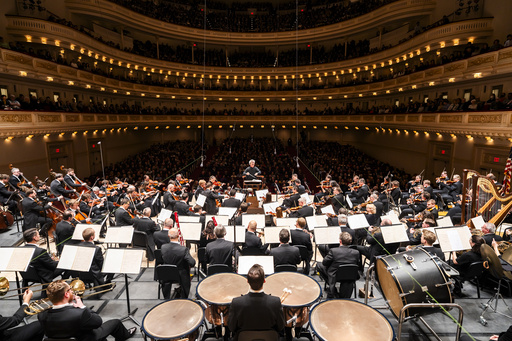
NEW YORK — Eva Krestová reminisced about the initial rehearsal with Semyon Bychkov as the chief conductor of the Czech Philharmonic, during which he led Shostakovich’s “Leningrad” symphony.
“I was trembling,” she recalled about that event held in Prague’s Rudolfinum. “He beamed at me, and at that moment, I felt capable. He offered me such kind words afterward, saying that my viola section truly needed my guidance.”
At the conclusion of the 100th anniversary Year of Czech Music, which takes place every decade in years ending with a 4, Bychkov is conducting the Czech Philharmonic on a North American tour that includes stops in New York and Toronto.
After undergoing lumbar decompression surgery in September, Bychkov is continuing to lead the orchestra while coping with pain. The 72-year-old maestro, who completed a new production of Wagner’s “Tristan und Isolde” at the Bayreuth Festival, was seen limping slightly at Carnegie Hall this week. He relied on a podium railing and music stands for assistance as he navigated the stage.
Following Thursday night’s concert, he utilized a crutch for support during a reception that included Czech Republic President Petr Pavel. He is scheduled for a hip replacement surgery once the tour concludes.
The connection between Czech composers and years ending in 4 is notable. Bed?ich Smetana was born in 1824 and died in 1884; Leoš Janá?ek was born in 1854; and Antonín Dvo?ák passed away in 1904. Bychkov’s program for the tour showcases works from this trio, along with pieces by Gustav Mahler, who was also born in what is now the Czech Republic.
Bychkov expressed that this music is deeply ingrained in the essence of his musicians. He recalled the Vltava (Moldau) portion of Smetana’s “Má vlast (My country),” which debuted in 1875.
“They were performing from the original parts. It’s nearly impossible to read the notes,” he remarked.
The conductor’s introduction of a new critical edition of the music spurred concern within the orchestra.
“He meticulously considers every single note, seeking precision and striving for absolute perfection,” noted Jana Boušková, the harp leader since 2005.
Born in Leningrad to Jewish parents, Bychkov’s family emigrated to Vienna in 1974 and then to the U.S. a year later. He attended the Mannes School of Music, where he met Julius Rudel, the general director of the New York City Opera. From 1980 to 1985, Bychkov served as music director of the Grand Rapids Symphony Orchestra, during which he gained U.S. citizenship.
Bychkov made his debut with the Berlin Philharmonic on January 8, 1985, stepping in for Riccardo Muti. Prior to that, on June 1, 1969, Bychkov was arrested while attempting to sneak into a concert of the Berlin Philharmonic in Leningrad, led by Herbert von Karajan.
“I found myself in the ladies’ room, trying to convince a woman that my interest wasn’t in her but in von Karajan, which probably worsened the situation. She screamed, and the police were just outside,” Bychkov recounted, adding that he was quickly released. “What could they do? It was not politically motivated; I wasn’t a foreign agent.”
Shortly after his debut with the Berlin Philharmonic, Bychkov had the opportunity to meet von Karajan when he returned to the Philharmonie after another conductor canceled.
“At one point, he asked, ‘So you’re in Grand Rapids now?’” Bychkov recounted, sharing a laugh with the renowned conductor. “I said, ‘Yes, I’m in Grand Rapids.’ I referenced it as my Ulm, which made him laugh heartily. He remarked, ‘You’re absolutely correct. A few years of that, and you’re ready for anything.’”
Following his time in Grand Rapids, Bychkov succeeded Rudel as music director of the Buffalo Philharmonic Orchestra from 1985-89. He then served in similar roles at the Orchestre de Paris from 1989-98 and the WDR Symphony Orchestra in Cologne from 1997-2010.
Bychkov first conducted the Czech Philharmonic in 2013 as a last-minute substitute and was subsequently invited by Decca Records to record a Tchaikovsky symphony cycle with the orchestra. After the passing of chief conductor Jirí Belohlávek in 2017, Bychkov assumed the chief conductor position starting in the 2018-19 season.
In Prague, while functioning as a guest conductor, Bychkov was approached by Josef Špa?ek, one of the orchestra’s first concertmasters, who entered his dressing room post-performance.
“I was still sweaty and hadn’t even changed yet,” Bychkov shared. “He said, ‘You bring out the best in us, and we would like you to be our next music director. We want you to be our daddy.’ At that moment, I had no intentions of accepting a permanent role since leaving Cologne in 2013, but how could I refuse when he said, ‘We want you to be our daddy’? Who could say no to 124 orphans?”
Renowned for his chain-smoking habits offstage, Bychkov is an elegant presence on the podium, characterized by graceful, balletic arm movements, dressed in loose black attire resembling pajamas. His long tenure will reach a decade by the time he departs at the end of the 2027-28 season.
Residing on the French Basque coast with his second wife, pianist Marielle Labèque, Bychkov shared a preference for the Biarritz airport.
“Why? Because within 15 minutes of arriving, I’m at home,” he explained.
However, he also expressed a dislike for that airport.
“Because every time I leave, it brings me down.”
